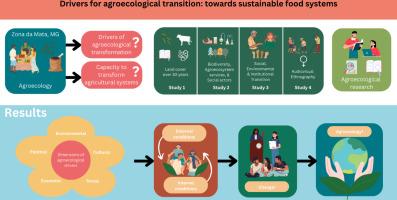Drivers for agroecological transition: An analysis of 40 years of experience in Minas Gerais, Brazil
IF 6.1
1区 农林科学
Q1 AGRICULTURE, MULTIDISCIPLINARY
引用次数: 0
Abstract
Context
Efforts are being made globally to promote transformations from conventional to agroecological agricultural systems. In many places, such efforts have been made in dialogue with peasant communities, involving a range of social actors with converging actions. Understanding the drivers of such transformations can elucidate key elements capable of promoting changes in the agrifood system.
The objective
Was to identify and comprehend the drivers of agroecological transition and their capacity to transform the agricultural system, based on the analysis of the experience in the Zona da Mata of Minas Gerais, Brazil, where such a process has been built since the early 1980's, involving different institutions and scales of transformation.
Methods
We analyzed and integrated the results of four PhD theses, carried out semi-structured interviews with different social actors regarding the transition in its social, environmental, and institutional aspects, and engaged in participant observation.
Results and conclusions
29 drivers were identified that promote agroecology by creating conditions and motivating peasants to switch from conventional to agroecological agriculture. These drivers act synergistically in the ecological, social, cultural, political, and economic dimensions. One crucial synergy is the combination of political support with bottom-up movements. The analysis of the drivers contributes to broadening the agroecological transition process.
Significance
The research is innovative by demonstrating that the analysis of drivers for agroecological transitions must be based on concrete experiences in the territories, the dimensions involved, the classification of the driver, the internal and external conditions of the peasant units that interfere in the transition process, and the impacts of the agroecological transition process for peasant families. Specifically, the articulation among cosmovision and identity, collective knowledge building, organizations at regional and national levels, political engagement, and nature-based technical solutions led countless families to promote and practice agroecology.

生态农业转型的驱动力:巴西米纳斯吉拉斯州 40 年经验分析
背景全球正在努力促进从传统农业系统向生态农业系统的转变。在许多地方,这种努力是在与农民社区对话的过程中进行的,涉及到一系列行动一致的社会行动者。目标根据对巴西米纳斯吉拉斯州 Zona da Mata 地区经验的分析,确定并理解生态农业转型的驱动因素及其改造农业系统的能力。方法我们分析并整合了四篇博士论文的成果,就社会、环境和制度方面的转型问题对不同的社会参与者进行了半结构化访谈,并参与了观察。结果与结论通过创造条件和激励农民从传统农业转向生态农业,我们确定了 29 个促进生态农业发展的驱动因素。这些驱动因素在生态、社会、文化、政治和经济方面发挥着协同作用。其中一个关键的协同作用是将政治支持与自下而上的运动相结合。对驱动因素的分析有助于拓宽生态农业转型进程。这项研究具有创新意义,它证明了对生态农业转型驱动因素的分析必须基于当地的具体经验、所涉及的层面、驱动因素的分类、干预转型进程的农民单位的内部和外部条件以及生态农业转型进程对农民家庭的影响。具体而言,世界观和身份认同、集体知识建设、地区和国家层面的组织、政治参与以及基于自然的技术解决方案之间的衔接,促使无数家庭推广和实践生态农业。
本文章由计算机程序翻译,如有差异,请以英文原文为准。
求助全文
约1分钟内获得全文
求助全文
来源期刊

Agricultural Systems
农林科学-农业综合
CiteScore
13.30
自引率
7.60%
发文量
174
审稿时长
30 days
期刊介绍:
Agricultural Systems is an international journal that deals with interactions - among the components of agricultural systems, among hierarchical levels of agricultural systems, between agricultural and other land use systems, and between agricultural systems and their natural, social and economic environments.
The scope includes the development and application of systems analysis methodologies in the following areas:
Systems approaches in the sustainable intensification of agriculture; pathways for sustainable intensification; crop-livestock integration; farm-level resource allocation; quantification of benefits and trade-offs at farm to landscape levels; integrative, participatory and dynamic modelling approaches for qualitative and quantitative assessments of agricultural systems and decision making;
The interactions between agricultural and non-agricultural landscapes; the multiple services of agricultural systems; food security and the environment;
Global change and adaptation science; transformational adaptations as driven by changes in climate, policy, values and attitudes influencing the design of farming systems;
Development and application of farming systems design tools and methods for impact, scenario and case study analysis; managing the complexities of dynamic agricultural systems; innovation systems and multi stakeholder arrangements that support or promote change and (or) inform policy decisions.
 求助内容:
求助内容: 应助结果提醒方式:
应助结果提醒方式:


